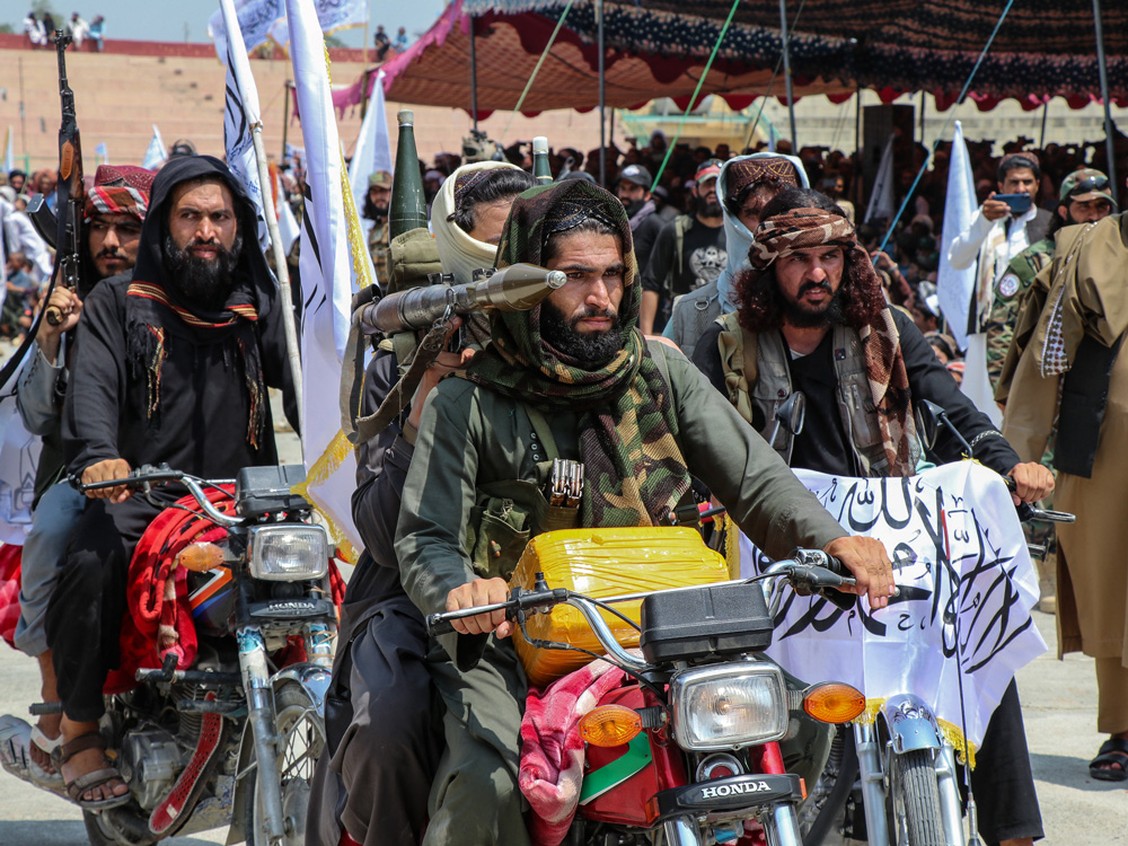Islamic Emirate of Afghanistan
"Going forward the strategic interests of Canada and our allies in Afghanistan have diminished.""As a result, a reduced programming footprint ... is proposed, focused on education health and gender equality in addition to humanitarian assistance."Canada's foreign affairs briefing note to Ahmed Hussen, minister for international development
 |
| Newly recruited personnel joining the Taliban security forces demonstrate their skills during their graduation ceremony in the western city of Herat |
Internal
Canadian government documents give some insight to Canada's ongoing
financial support to Afghanistan in humanitarian aid, meant to be
delivered to suffering Afghans living a life of privation under Taliban
rule, in the hopes that none of that financial aid goes to the
government itself. The "Islamic Emirate of Afghanistan" under Taliban
administration, has no diplomatic recognition from any nation. It has no
international legitimacy. And its toxic rule has been a life-stopper
for Afghan girls and women.
Global
Affairs Canada issued a briefing note that while recognizing Canada's
diminished focus on the country at a time when new crises are erupting
elsewhere in the world, that ongoing funding in areas such as health,
education and women's rights be maintained; given the odium in which the
fundamentalist Islamist regime is held, there is no popularity among
Canadian taxpayers to expend charitable funding to a country that its
extremist rulers would be swift to appropriate.
"This could generate negative media interest",
the document warns, should it be publicized, recommending a "reactive"
communications strategy. Since the Taliban took over in 2021 and foreign
missions were withdrawn along with a coalition led by the United States
of military forces, the Taliban expelled international humanitarian
groups leading to an exacerbated condition of non-foreign-interference
in the affairs of the country bringing issues of education, health, food
scarcity to a head.
 |
Most
countries strive to avoid direct government-to-government contact with
the Taliban that risks legitimizing a regime known for its human rights
abuses. Afghanistan is a country whose people face severe humanitarian
pressures; the United Nations estimating that over 12 million Afghans
suffer "acute food insecurity". Canada's government while refusing to
recognize the Taliban as a legitimate government, has provided $367
million in assistance in the past three years.
"Canada has continued to provide development assistance to the people of Afghanistan",
a Global Affairs spokesman affirmed to an investigating journalist.
Over the years of Canada's active involvement in Afghanistan the total
that the government of Canada provided was over $4 billion in aid. Under
the Taliban, girls are barred from attending school past Grade 6. Women
cannot participate in most areas of the economy, and harsh rules have
been imposed on their dress and their participation in social life.
"A country like Canada can't do everything everywhere all the time. But if there's ever a place where values, historical obligation and interests kind of align, it's Afghanistan.""There is no place in recent history where not just Canadian Forces but also civilians and diplomats were as present for as long as they were in Afghanistan."Martin Fischer, spokesman, World Vision Canada
There
is nothing quite like the passion of humanitarian groups urging
governments to fund their missions abroad. It is their reason for
existence. For employing locally engaged people. For priding themselves
on supporting those for whom few options remain other than to dream of a
future without coercion, insecurity and starvation. That, in the
process of delivering their humanitarian aid they relieve dictators of
their own responsibility to provide for their populations is irrelevant;
as is the fact that indirectly they are supporting those dictatorships.
Since
Canada closed its embassy, cutting off direct assistance to the Afghan
government since the Taliban takeover it has continued to provide
critical support "without compromising our values",
Global Affairs insists. Pointing out that 40,000 Afghans were brought
to Canada, ostensibly saving them from Taliban threats, but leaving the
question of adequate security measures being in place through the
process. That an incident of recent street protests where extremists
gathered to condemn Israel for its war in Gaza following the terrorist
assault on Israel, flags of Hamas, Hezbollah and the Taliban have been
seen. 'Death to Canada' has been heard, along with 'Death to Israel'.
The
government of Canada insists that much of its funding aid has been
directed to the Afghanistan Resilience Trust Fund, a World Bank project;
funding that the briefing note recommended be reduced. Funding directed
elsewhere in aid to Afghanistan is meant to focus on health, education,
female rights and empowerment and humanitarian aid, the Global Affairs
briefing note adds.
 |
| A Taliban fighter stands guard as women wait to receive food rations distributed by a humanitarian aid group in Kabul last month. |
"Should the reduction in the department's international assistance to Afghanistan be publicized, this could generate negative media interest.""[However], the proposed approach is not expected to garner media and/or public attention.""The department recommends a reactive communications approach."
Labels: Fundamentalist Extremism, Government of Canada, Humanitarian Funding, Islamic Emirate of Afghanistan

<< Home